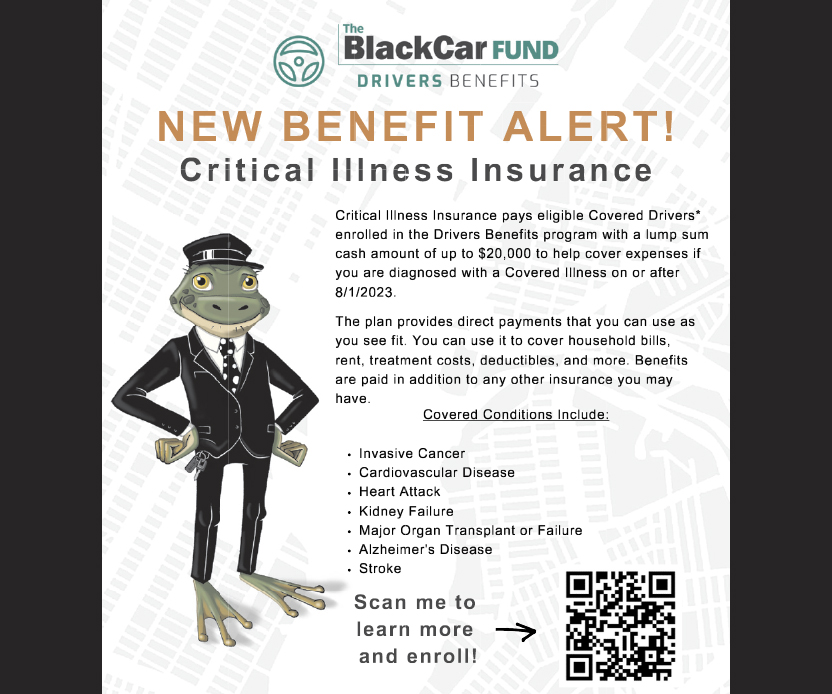Hello, and Happy New Year to all! 2020 was certainly a year that none of us will ever forget, and I’m excited to start 2021 with the hope that this will be a year when things start to get better. However, it does seem that before that can happen, we will have to continue through a rough patch. The COVID-19 numbers throughout New York keep getting worse, and both Governor Cuomo and Mayor de Blasio have floated the idea that another shutdown of some type is on the horizon. As of now, indoor dining in New York City has again been suspended, and it’s possible that by the time you’re reading this, even more restrictions may be in place.
The newly approved Pfizer and Moderna vaccines are certainly a sign of hope in these times. The biggest question with the vaccines though, is how long it will take before you can get access to it. With regard to that, the Black Car Assistance Corporation (BCAC) worked with the International Association of Transportation Regulators (IATR) to submit commentary to the Advisory Committee on Immunization Practices (ACIP), strongly supporting including passenger ground transportation workers among those given high vaccine priority.
The drivers in the ground transportation industry have been unquestionably essential to the continued functioning of society, and they are also among those with the highest risk of exposure. The ACIP’s recommendations, which the Centers for Disease Control (CDC) has adopted, included transportation workers in Phase 1c of vaccine distribution, which means that you will likely be able to get access to the vaccine sooner than later. Make sure to keep an eye out for news on this and stay connected with The Black Car Fund, as we will be quickly notifying drivers when the vaccine becomes available to them.
The biggest news this month was likely the agreement reached by Congress on a new, $900 billion stimulus package. It seemed poised to be quickly passed, but at the last minute, President Trump called on Congress to increase the direct cash payments to Americans to $2,000 from $600. At the time I’m writing this, the bill is still in limbo. House Democrats quickly introduced legislation to increase the payments to $2,000, but it was rejected by Republicans. Ultimately, if Trump were to veto the relief package, there will likely still be enough support in Congress to override the veto, but it remains to be seen how this plays out.
Moving onto news in New York City, the first topic I’d like to cover are the rules changes that the TLC passed early this month. The TLC passed rules changes to summary suspension, which you can read here, as well as several miscellaneous cleanup rules which you can read here. I believe the summary suspension rules changes will ultimately help prevent cases where a driver is left in limbo regarding their summary suspension and will also make things better for drivers whose summary suspensions are lifted after being reviewed. I encourage you to read them.
A specific section of the miscellaneous cleanup rules initially brought a serious concern to the Black Car Assistance Corporation. The intent of this section was to ensure that traditional black car bases could continue their previously agreed upon pay schedules and the practice of passing along summonses, while excluding the High-Volume FHVs (HVFHVs) from these practices because the business models for these companies are very different. For example, traditional black car bases generally work with corporate accounts, while the HVFHVs receive payment electronically and instantly.
However, one similarity between the HVFHVs and some traditional black car bases is that they are both organized as cooperatives. While most traditional bases are franchises, the language of the original cleanup rules sought to exclude all cooperative bases from the practices mentioned above. This would have unfairly targeted some traditional bases and created an unfair playing field within this industry. This was not the TLC’s intent, so the BCAC drafted legislative language to ensure that both franchise and cooperative model traditional bases would be on equal footing. When the rules were passed earlier this month, they included our updated language. Had it not been for the BCAC, some of the larger traditional black car bases would have been upended.
Also this month, the MTA issued a financial disclosure form that revealed that the City’s congestion pricing plan was likely to be delayed until at least 2023, due to inaction by the Federal Government. While the MTA did, however, express hope that the plan would move forward with the Biden Administration, it seems likely that the current delays would still push the start of the plan to 2023 at the earliest.
The MTA has still not yet set the price of the tolls and the infrastructure required to automatically charge tolls has not even begun to be installed. The COVID-19 pandemic has already placed great strain upon the MTA’s finances and the delay of congestion pricing will only make it worse. As this process continues, myself and the BCAC will continue working with the Port Authority to ensure that the black car industry is treated equitably! After all, we already succeeded in getting them to lower the initially proposed fee from $4 to $2.50.
On a final note, the City is strongly pushing the State to change laws so that speed cameras in New York City could operate 24 hours a day, seven days a week. Under the current law, which was passed in 2019 and started an explosion in the number of speed cameras throughout the City, they are only allowed to operate between 6:00am and 10:00pm on weekdays. Over the next year, the Department of Transportation (DOT), will continue installing cameras at the rate of 60 per month, aiming to have over 2,000 total cameras by the end of 2021. This will be important to keep an eye on and I’ll be sure to update you all on any new developments. In the meantime, drive safe!



